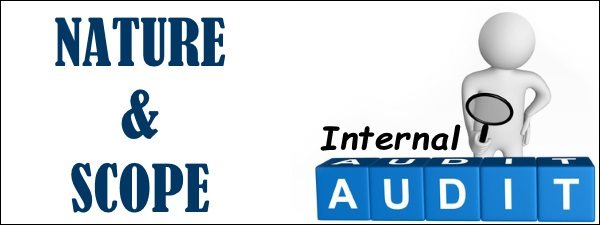Nature and Scope of Internal Audit
Internal Audit is a control that is concerned with the examination and appraisal of other controls. The ultimate purpose of internal audit is protection of the properties or assets of the business, not only from fraud but also from other factors like waste, loss, etc.

Nature of Internal Audit
The following are the nature of internal audit:
1. Independent: The internal auditor should work independently. The word independent implies that the audit work should be free from any sort of restrictions that may have a significant impact on the scope and effectiveness of the review process and on the reporting of the findings and conclusions. Therefore, the internal audit work is detached from regular day-to-day operations of the organization.
2. Appraisal: The word appraisal implies a critical evaluation and assessment of the existing controls and operations of the business enterprise. The internal auditor should appraise them on the basis of appropriate criteria.
3. Established: The management should organize an independent internal audit department and duties should be specifically assigned to the department.
4. Examine and Evaluate: The terms of examination and evaluation describe the two fold functional roles and responsibilities of the internal auditor. Firstly the internal auditor should make an examination and enquiry for fact finding. Secondly he should make a judgmental evaluation after thorough examination.
5. Activities of the Organization: Internal audit aims at conducting a systematic examination of records, procedures and operations of an organization. The internal auditor should carefully examine the controls established inside the organization. In this sense internal audit can be described as Control Over Other Controls. Controls are essential for every organization. In the absence of controls, it would be impossible for any organization to protect its assets, rely on the records and perform its functions successfully. The internal auditor examines the effectiveness of each control system and traces out the deficiencies in each system.
6. Service: Internal audit is a service to the whole organization. The internal auditor is an employee of the organization. His services can be availed at any time of emergency. His advice can be obtained on any matter or point significant from the business and strategic point of view. His services can also be effectively utilized by other employees from the top to bottom. Any employee can consult him in solving the day-to-day problems.
7. To the Organization: The primary concern of an internal auditor is the phase of business activity where he can render any service to the management not only top management but all other managerial as well as operating staff. Therefore, the internal auditor should be an expert in all branches of business. In this respect, the internal auditor is superior to the financial auditor and even the cost auditor. His services are very useful to all the employees throughout the organization at all times. The terms ‘To the Organization‘ also signifies that internal audit is a total concept of service having a broad meaning and connotation.
Scope or Functions of Internal Auditing
Internal audit involves five major functions or areas of operation. They are as below:
1. Reliability and Integrity of Information: The internal auditor should review the reliability and integrity of financial and operating information and examine the effectiveness of the means used to identify, measure, classify, and to report such information.
2. Compliance with Policies and Procedures: The systems and procedure also.have considerable impact on the operation of the business enterprise. The internal auditor should gauge the effectiveness and impact of such systems and report thereon.
3. Safeguarding the Assets: The internal auditor should review the existing system for safeguarding the assets and if necessary should verify the existence of such assets.
4. Economical and Efficient Use of Resources: The internal auditor should also appraise the economy and efficiency with which the resources are employed. Further the internal auditor should identify the conditions, which would prevent the economical use of resources. They are as follows:
- Under utilization of capacity.
- Non-productive work.
- Procedures, which are not cost, justified.
- Over staffing or under staffing.
5. Accomplishment of the Established Objectives and Goals: The internal auditor should make a review of the operations or programmes of the enterprise and should ascertain whether the results are not inconsistent with the established goals and objectives of the enterprise. He should also ascertain whether the programmes are carried out as per plan.
